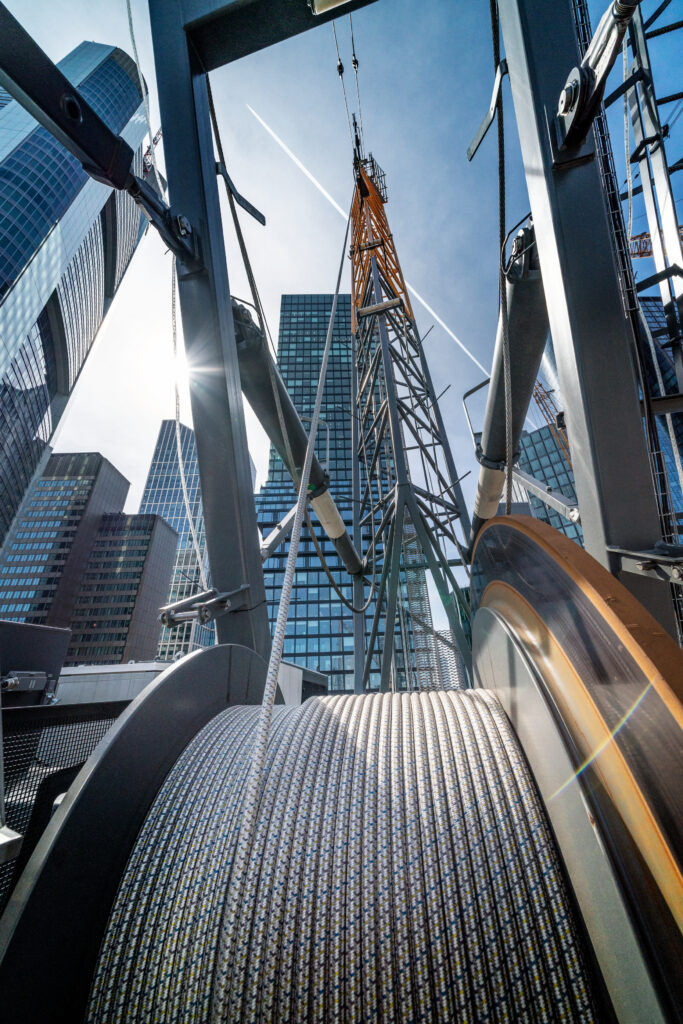Liebherr will unveil its first large cranes featuring a fibre rope and its first hydraulic luffing jib crane at the construction machinery show in Munich. Whether they are for enormous hook heights or particularly constricted sites – these new cranes enhance Liebherr’s reputation as a reliable partner on sites of all types. At the same time, Liebherr is working on new technologies to make crane operations even safer and more economical.
When it launched its pioneering fibre rope over three years ago, Liebherr also unveiled its first fibre cranes in its popular EC-B series. Flat-top cranes featuring a high-tensile fibre rope, which is the result of 10 years of development work by Liebherr and rope manufacturer Teufelberger, are now showing what they can do every day on sites around the world. Now Liebherr is taking the next logical step – fibre cranes for particularly challenging hook heights and hoists.
For the very first time, HC-L and EC-H series cranes will now be available in fibre versions – the crane for special projects, the 1188 EC-H 40 Fibre, and the luffing jib crane, the 258 HC‑L 10/18 Fibre. The high-tensile fibre rope for large cranes has a diameter of 25 millimetres (previous versions measured 20 and 22 millimetres in diameter). The significant weight difference between a 25 millimetres steel rope and a fibre rope of the same thickness means that the new fibre cranes can be used to build skyscrapers and industrial plants with even greater efficiency. The latest “Tough Guys” from the EC-B series, the 370 EC-B 16 Fibre and the 520 EC-B 20 Fibre, also feature the 25 millimetre fibre rope.
Greater hook heights, better performance, less wear
The lighter fibre rope is particularly noticeable on specialist cranes for great hook heights, the HC-L cranes. This is because every metre of additional hook height means that the benefits of this significantly lower rope weight increase. The use of the fibre rope enables the lifting capacities at the jib head to be increased by up to 20 percent compared to the steel rope versions. In addition, the fibre rope delivers a significantly longer service life than a steel rope. As the fibre rope only weighs around one-fifth of a steel rope, it is also significantly easier to handle for erection engineers when reeving the hoist rope. Furthermore, the fibre rope is easier to maintain as it does not require lubrication. That also means that the downtimes of the crane are reduced.
What is more, safety during crane operations is palpably increased – the various components of the cover wear at different rates, and the crane operator can see at a glance that the rope has to be replaced at the latest when the red layer under the cover fabric appears. In addition, fibre ropes deliver another method of reducing an ecological footprint. This is due both to the rope material and the fact that it makes it possible to use a lighter crane construction.
First hydraulic luffing jib crane from Liebherr
Liebherr will also unveil its first hydraulic luffing jib crane at the construction machinery show in Munich. The 195 HC-LH 6/12 can hoist up to 2550 kilograms at the jib head at its maximum radius. The hydraulic luffing jib crane achieves these fantastic values when combined with the climbable 16 EC tower system whose dimensions of 1.6 x 1.6 metres mean it has a very small footprint and can be transported easily to the site by truck or container. Slimline tower systems, great hook heights, high performance and climbable – this complete package makes Liebherr’s hydraulic luffing jib crane unique.
In addition, the hydraulic luffing jib crane also particularly stands out from the crowd due to the fact that it is easy to erect and very simple to transport. In addition, the very small out of operation setting and the facility to control it using the popular Litronic assistance systems such as Micromove, the operating-range limiting system and level luffing are absolutely state of the art.
Smart assistance systems and technologies for even greater safety
The construction site of the future not only requires powerful machines but also smart digital solutions for crane operations. At the construction machinery show, Liebherr will provide an insight into new planning and analysis tools, such as 3D models for planning a site in detail. A digital site diary helps to analyse the efficiency of the construction machinery in retrospect.
Furthermore, Liebherr is working on solutions to improve crane operating even more – firstly in the form of the new intuitive TC-OS control interface and secondly by remote control for tower cranes. The new control interface, which is already in use in many cranes, enables crane operators and service engineers to navigate through a practical menu structure using a touchscreen. The remote control enables the crane operator to control the crane from outside the cab. This means greater flexibility in structuring his working day.
Another focus is the development of new assistance systems which support crane operators using intelligent sensors and algorithms and therefore make a major contribution to enhancing safety on site. All these technologies form the basis for the future of crane operations.



 Copyright 2017-2023 All rights reserved.
Copyright 2017-2023 All rights reserved.